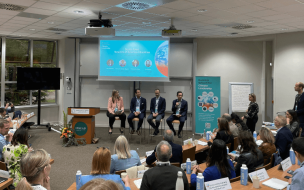He says that business analytics in particular is disrupting the financial services sector, healthcare, and the entire IoT movement — a much-hyped area whereby cars, electricity meters and even refrigerators are fitted with smart sensors.
What’s more, he muses, the number of MBA jobs that business school graduates without adequate tech training are excluded from is on the rise.
Theos serves as academic director of INSEAD’s elab, the research center that focuses on data analytics for business. He recently developed a novel course in this area for MBAs and executives, which is based on cloud technologies and open-source analytics tools.
How is big data changing the management of organizations?
A major impact of big data is on the development or refinement of new information-based services and products. For example, the Internet of Things has the potential to transform the business models of companies producing physical products, moving them more towards service models.
What skills do managers need for effective data management?
Think of the impact [Microsoft] Excel had on managers’ daily jobs. The impact from big data may be a similar, or bigger, leap forward in terms of how it will change people’s jobs. Much like the introduction of Excel required managers to develop basic technical and quant skills, going to the next stage will require even more quant and technical skills.
Managers will need to learn new tools to analyze and visualize information, and also develop their ability to better communicate with data scientists.
In what industries do you expect big data to disrupt business?
It has already been happening in the financial sector for decades (it was not called “big data”, but was quite big “data”). However, the industries that may be mostly affected now are all around the Internet of Things, as well as healthcare — think of DNA data, for example.
Despite the huge demand for data analytics, reports continue to cite a lack of adequate talent. Are we not producing the management talent business needs?
We are not, indeed. Education now is not about old versus new skills, but about old and new skills. For example, both traditional management skills but also new data science ones [must be taught]. This is more challenging.
Are business school graduates without analytics training at a disadvantage in the jobs market?
It depends on the industry and job. The number of jobs they are excluded from is definitely increasing.
What challenges do companies face in developing a culture in which they can truly utilize big data?
Being open to innovations that may be coming from bottom up instead of top down may be a challenge for many organizations.
Making data available across the organization can open many possibilities for innovations that may mostly be coming from non-traditional business units, for example from data scientists spread across the organization.
Embedding data scientists within the organization is also a challenge.
RECAPTHA :
7b
45
e6
3f








